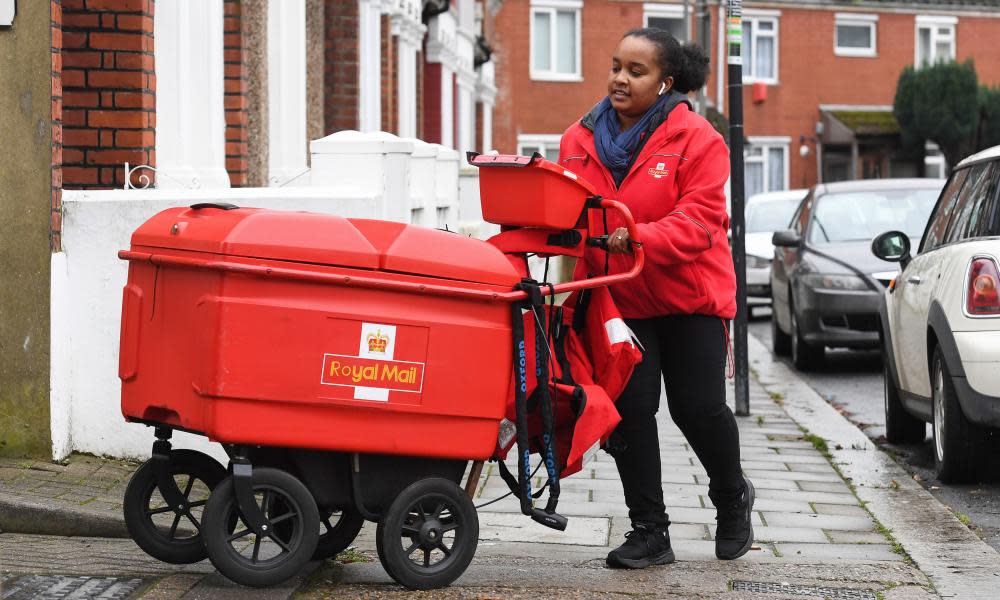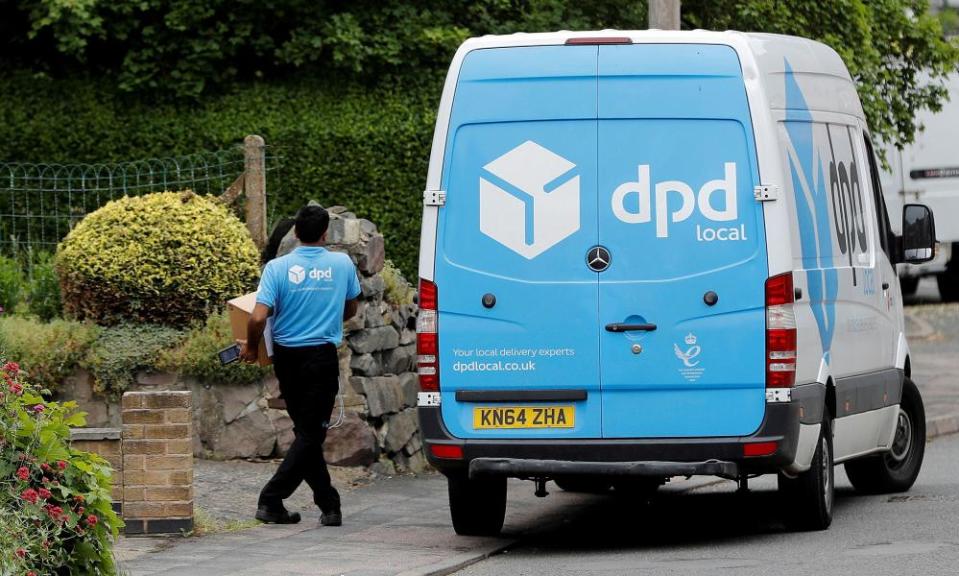Weighty postbag of problems as Royal Mail reels from a Christmas hangover

The image was arresting, and dispiriting. A mound of sealed Royal Mail sacks piled up in a large store room at a postal sorting centre in Bristol. Many of the items awaiting processing were doubtless Christmas presents which probably did not arrive on time.
The photograph, posted by the Communication Workers’ Union (CWU) on social media in the middle of December, highlighted just part of the backlog in Royal Mail’s system during the festive season.
The CWU published the photo to elicit support for members tackling what it said were “unprecedented workloads” as they tried to deliver Christmas cards, presents and surging online shopping orders during the pandemic.
But Royal Mail’s problems didn’t disappear along with the Christmas decorations: letters and parcels are still piling up around the country. Turning around this chaotic performance will now fall to Royal Mail’s new chief executive. Simon Thompson, who took up his post last week, is Royal Mail’s third full-time boss in under three years. April 2018 saw the departure of Moya Greene – whose eight years at the helm included the controversial privatisation of the firm – and her successor, Rico Back, made a surprise exit last May.
Thompson’s problem is that mail volumes remain high while Royal Mail is having to operate within social distancing requirements and cope with staff absences as workers contract Covid or have to self-isolate.
Last Friday the company published a list of 31 areas which are not regularly receiving post, including Leeds, parts of Essex and east London, and some places in Bristol. This is despite it having retained around a third of its 33,000 temporary festive workers, hired 6,000 additional vehicles, and kept open four temporary parcel sorting centres.
Our members in Royal Mail are facing unprecedented workloads. They are doing absolutely everything they can to keep the country connected.
Pandemic + Christmas + record traffic
Serving the public is engrained in postal workers. Show them some love in the comments below 👇 pic.twitter.com/CTqOMjY7UX— The CWU (@CWUnews) December 16, 2020
The London School of Management Education is in Ilford, east London, one of the areas where the postal service is disrupted. Executive director Dr Ravi Kumar said the school has been hit by delays in both receiving and sending mail for a couple of months. The higher education provider uses Royal Mail to post transcripts and assessments to its 550 students, all of whom are all learning remotely.
Graduation certificates posted in late November using first-class recorded delivery took between four and six weeks to arrive, Kumar said, and even now the school is only receiving post once or twice a week.
Royal Mail declined to give details of Covid-related absences, but said it varied by area and added that it was working to deliver as normal a service as it could, including drawing in extra resources and offering additional overtime where possible.
And the problems aren’t limited to Royal Mail: social media platforms are awash with complaints about delayed or missing parcels from rival delivery firms including Hermes, DPD and Yodel.
At Royal Mail, Thompson’s in-tray is full, and he will have to grapple with many of the same problems as perplexed his predecessors. The former Ocado executive, who recently worked on the NHS test-and-trace programme, is not a stranger to the postal service: he has been a non-executive director since 2017.
Thompson will need to prioritise good relations with trade unions, which have clashed with Royal Mail as it tried to restructure and improve efficiency. The company finally ended a two-year dispute with workers in December, agreeing a settlement with the CWU that gives staff an above-inflation pay rise and a reduction in hours, although wider negotiations continue.
Investors will be relatively content to see that Royal Mail’s share price has risen by 60% in the past nine months, reaching £3.86, which is 17% higher than its 2013 flotation price and values the business at £3.8bn. Yet Thompson will be unable to reverse the terminal decline in letter writing, thanks to emails, social media and text messaging. This has accelerated during the pandemic: Royal Mail delivered 1.1bn fewer letters in the five months to the end of August than in the same period in 2019.

The company wants to focus on the more lucrative parcels business. Revenue earned from parcels overtook revenue from letters for the first time in the first half of its current financial year.
But its universal service obligation requires Royal Mail to deliver letters six days a week and parcels five days a week to every address in the UK, at a standard price.
It is edging closer to scrapping Saturday letter deliveries after Ofcom – the communications regulator – said this would have no significant impact on consumers. The change would save Royal Mail an estimated £225m a year by 2022-23.
But this won’t be enough to cover its losses by 2023, according to Dr Paul Simmonds of Warwick Business School. “They are fighting battles with one arm tied behind their back in the market because of the cost of meeting this universal service obligation,” he said.
“They have a great infrastructure, which they could leverage through parcel deliveries, but it is a very expensive infrastructure to be forced to maintain.”
Online shopping orders are expected to decline once coronavirus restrictions ease and shops reopen, but few analysts expect them to drop back to pre-pandemic levels. The lockdowns have changed consumer behaviour in a way that benefits companies like Royal Mail.
But in the parcel delivery market, it is competing with cheaper, leaner rivals that aren’t bound by the same service obligations, and which may soon get access to the Post Office’s branch network. The decade-long exclusive partnership between Royal Mail and the Post Office ends in March; after that, customers will be able to drop packages for other courier companies off at post offices.
Royal Mail’s history goes back more than 500 years – the onus is now on Thompson to make it a business fit for the post-pandemic world.
Royal Mail’s rivals

Royal Mail is still by far the largest parcel delivery company by volume in the UK, but it faces tough competition from a range of leaner, younger competitors. The company said in December it was on course to deliver more parcels in the UK in the three and a half weeks before Christmas than some of its rivals handle in an entire year.
Hermes
The UK’s second-biggest parcel firm after Royal Mail has 5,500 full-time employees as well as a network of 27,000 couriers, who are mostly self-employed. The company handled 600 million parcels in 2020, a 50% increase on the 400 million processed in 2019. Hermes, part of the German Otto group, can trace its origins in the UK back to the 1970s, when the Grattan mail order catalogue business decided to launch its own home delivery model.
DPD
The parcel delivery firm announced in 2020 that it was creating 6,000 new jobs, including 3,500 drivers and 2,500 new full-time staff in depots, hubs and management positions. DPD, which handles parcels for Marks & Spencer and Asos, also announced a £200m investment to expand its next-day parcel delivery service. The firm, which is owned by France’s La Poste group and operates delivery services around the world, reported a 40% rise in parcel volumes over the Christmas period compared with a year earlier.
Yodel
Parcel carrier Yodel is part of the multibillion-pound business empire owned by Sir Frederick Barclay and the family of Sir David Barclay, who died last week. It handles more than 160 million parcels a year, and claims a relationship with 85% of the UK’s top retailers. With headquarters in Liverpool, the company runs more than 50 sites across the UK, including three sorting centres and employs 10,000 people. Yodel said it carried a record number of parcels during its peak season from 15 November to 2 January, 37% more than during the same period in 2019.

 Yahoo Movies
Yahoo Movies 
